Por Vicki Gass:
(Español)
La crisis política y de derechos humanos en Nicaragua se profundizó en el período previo a las elecciones presidenciales de 2021, con la detención de candidatos de la oposición, sus simpatizantes y activistas de derechos humanos y justicia social de base. Si bien la liberación de 222 prisioneros políticos a inicios del 2023 fue acogida por la comunidad internacional, la expulsión de los prisioneros demostró que el gobierno Ortega-Murillo no tiene tolerancia con la disidencia. La represión y detención de activistas ha continuado desde entonces.
El gobierno de los Estados Unidos de América, junto con otros gobiernos de América Latina y Europa, han tratado de presionar al régimen Ortega-Murillo mediante diplomacia bilateral y multilateral para que libere a los presos, abra espacio político y se encamine a elecciones libres y justas. La diplomacia ha ido acompañada de una serie de sanciones, incluidas medidas de bloqueo de activos dirigidas contra 46 personas y 11 entidades, además de denegaciones de visa dirigidas a más de 800 funcionarios nicaragüenses y sus familiares.
El propósito de este estudio es analizar las herramientas ofrecidas por las leyes RENACER y NICA Act para ejercer presión económica sobre el gobierno de Nicaragua, proteger los derechos humanos y restaurar la democracia. Además, explora si las sanciones podrían conducir a una presión significativa sobre los líderes del régimen y en los sectores influyentes del país. Además, el estudio realiza una mirada preliminar a las empresas y personas naturales o sectores comerciales que sustentan el régimen que podría ser sancionado en el futuro.
(English)
The political and human rights crises in Nicaragua deepened in the run-up to the 2021 presidential elections, with the detention of opposition candidates, their supporters, and grassroots human rights and social justice activists. While the release of some 222 political prisoners in early 2023 was welcome, the immediate expulsion of the prisoners showed that the Ortega-Murillo government has no tolerance for dissent; the repression and detention of activists have continued in recent months.
The United States government, along with others in Latin America and Europe, has sought, through bilateral and multi-lateral diplomacy, to press the Ortega-Murillo regime to release prisoners, open political space, and move toward free and fair elections. Diplomacy has been accompanied by various sanctions, including asset-blocking measures directed against 46 individuals and 11 entities and visa denials directed at over 800 Nicaraguan officials and their family members. The purpose of this study was to analyze the tools offered by the RENACER and NICA Act to apply economic pressure on the Nicaraguan government to protect human rights and restore democracy and to explore whether and how sanctions might lead to meaningful pressure on the regime.
The purpose of this study was to analyze the tools offered by the RENACER and NICA Act to apply economic pressure on the Nicaraguan government to protect human rights and restore democracy and to explore whether and how sanctions might lead to meaningful pressure on the regime leadership and influential sectors. In addition, the study takes a preliminary look at companies and individuals or trade sectors that sustain the regime that could be sanctioned in the future.

